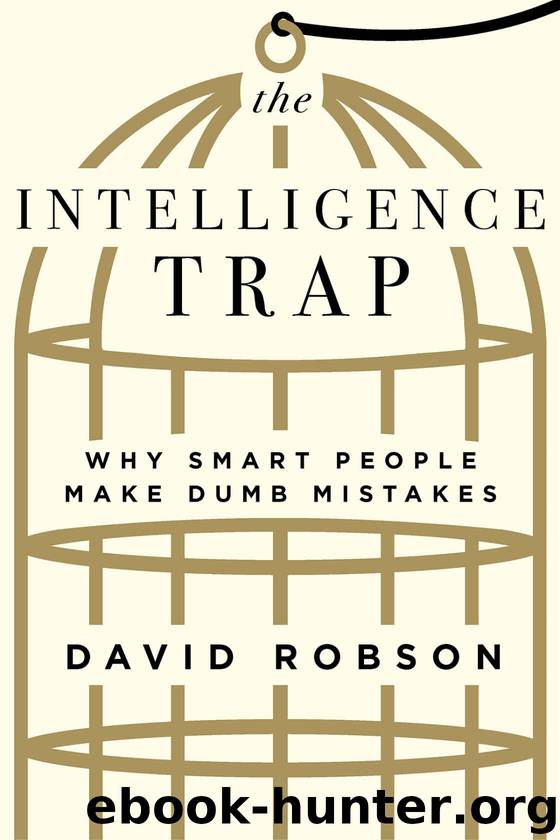The Intelligence Trap: Why Smart People Make Dumb Mistakes by David Robson

Author:David Robson [Robson, David]
Language: eng
Format: azw3, epub
Tags: Epub3
Publisher: W. W. Norton & Company
Published: 2019-08-05T16:00:00+00:00
Let’s first consider curiosity, a trait that appears common in many other high achievers besides Feynman.
Charles Darwin, for instance, had failed to excel in his early education and, like Feynman, he certainly didn’t consider himself to be of above average intelligence, claiming that he had “no great quickness of apprehension or wit which is so remarkable in some clever men.”10
“When I left the school I was for my age neither high nor low in it,” he wrote in an autobiographical essay.
And I believe that I was considered by all my masters and by my father as a very ordinary boy, rather below the common standard in intellect. . . . Looking back as well as I can at my character during my school life, the only qualities which at this period promised well for the future were that I had strong and diversified tastes, much zeal for whatever interested me, and a keen pleasure in understanding any complex subject or thing.11
It is difficult to imagine that Darwin could have ever conducted his painstaking work on the Beagle—and during the years afterwards—if he had not been driven by a hunger for knowledge and understanding. He certainly wasn’t looking for immediate riches or fame: the research took decades with little payoff. But his desire to learn more caused him to look further and question the dogma around him.
Besides his groundbreaking work on evolution, Darwin’s ceaseless interest in the world around him would lead to some of the first scientific writings on the subject of curiosity, too, describing how young children naturally learn about the world about them through tireless experimentation.12
As later child psychologists noted, this “need to know more” was almost like a basic biological drive, or hunger, for a young infant. Despite this scientific pedigree, however, modern psychologists had largely neglected to systematically explore its broader role in our later lives, or the reasons that some people are naturally more curious than others.13 We knew that curiosity was crucial for taking our first intellectual steps in the world—but little after that.
That was partly due to practical difficulties. Unlike general intelligence, there are no definitive standardized tests, meaning that psychologists have instead relied on more tangential indicators. You can observe how often a child asks questions, for instance, or how intensely they explore their environment; you can also design toys with hidden features and puzzles, and measure how long the child engages with them. With adults, meanwhile, one can use self-reported questionnaires, or behavioral tests that examine whether someone will read and probe new material or if they are happy to ignore it. And when modern psychologists have turned to these tools, they have found that curiosity can rival general intelligence in its importance over our development throughout childhood, adolescence, and beyond.
Much of that research on curiosity had examined its role in memory and learning,14 showing that someone’s curiosity can determine the amount of material that is remembered, the depth of the understanding, and the length of time that the material is retained.
Download
The Intelligence Trap: Why Smart People Make Dumb Mistakes by David Robson.epub
This site does not store any files on its server. We only index and link to content provided by other sites. Please contact the content providers to delete copyright contents if any and email us, we'll remove relevant links or contents immediately.
The Art of Thinking Clearly by Rolf Dobelli(10408)
Mindhunter: Inside the FBI's Elite Serial Crime Unit by John E. Douglas & Mark Olshaker(9312)
Change Your Questions, Change Your Life by Marilee Adams(7732)
Nudge - Improving Decisions about Health, Wealth, and Happiness by Thaler Sunstein(7689)
Mastermind: How to Think Like Sherlock Holmes by Maria Konnikova(7313)
The Power of Now: A Guide to Spiritual Enlightenment by Eckhart Tolle(5742)
Men In Love by Nancy Friday(5229)
Altered Sensations by David Pantalony(5091)
Factfulness: Ten Reasons We're Wrong About the World – and Why Things Are Better Than You Think by Hans Rosling(4729)
The Confidence Code by Katty Kay(4245)
Thinking in Bets by Annie Duke(4213)
Man and His Symbols by Carl Gustav Jung(4120)
The Worm at the Core by Sheldon Solomon(3483)
Why Buddhism is True by Robert Wright(3441)
Liar's Poker by Michael Lewis(3437)
Three Women by Lisa Taddeo(3418)
The Inner Life of Animals by Peter Wohlleben(3302)
Descartes' Error by Antonio Damasio(3268)
How Music Works by David Byrne(3255)
